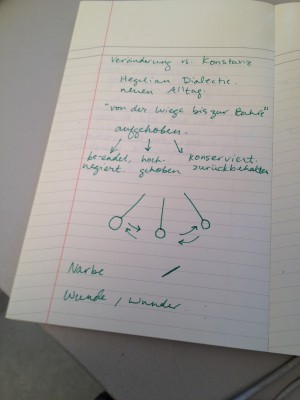I first met Brittani Sonnenberg in 2081. In the stuffy dark attic under the roof of the Kunst-Werke in Berlin she was reading a text on retro-future for Georg’s and Christopher’s congress “What happened in 2081?” while downstairs other members of the gang were collecting an archaeology of what was to come (little did we know).
Brittani used to play basketball with the guys like a boss but never allowed me to come and cheer. She sometimes speaks with a Southern drawl, and sometimes, speaking English, she slips into German and unconsciously invents new idioms which have their origin and place somewhere in between languages. She also speaks Mandarin, sort of. Brittani is at home in many places, she was born in Hamburg and has lived in Philadelphia, London, Atlanta, Minneapolis, Shanghai, Singapore, Boston, Phnom Penh, Ann Arbor and now Berlin. She informed me that she graduated from high school in Singapore, “so that’s where the ‘growing up’ part stops.” We have had many conversations about growing up, about home, about being foreign, and about our dystopian visions of our futures with cute little Neo-Mormons running all over the hologram lawn (her words). She is, as you can see, a writer. Her fiction and nonfiction has appeared in The O’Henry Prize Stories 2008, Asymptote, Ploughshares, Time Magazine, as part of the Berlin Stories and elsewhere. I am incredibly curious about her novel Home Leave which is going to be published in 2014.
Sometimes she looks like an Andy Warhol superstar.







